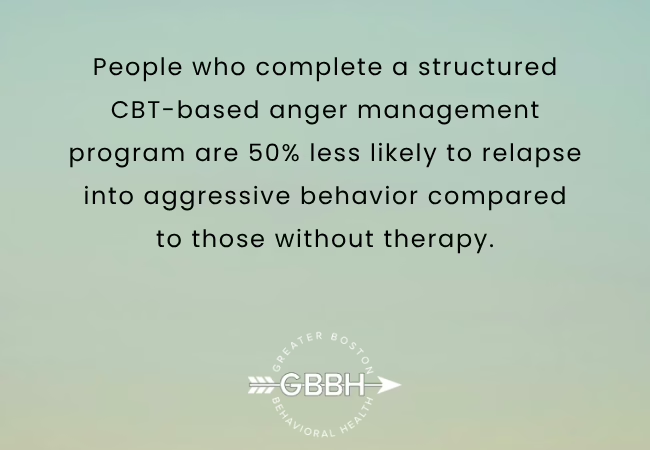Anger is a normal human emotion—but when it becomes chronic, explosive, or uncontrollable, it can damage your health, relationships, and well-being. Many individuals don’t realize that anger is often a learned reaction, shaped by thoughts and experiences from the past.
You snap at the people you love. You regret what you said five minutes ago. Your heart races, your fists clench—and afterward, you’re left asking yourself, “Why do I get so angry?” If this sounds familiar, you’re not alone.
Anger is a powerful emotion—one that can damage relationships, careers, and even your physical health if left unchecked. But anger isn’t the real problem. Often, it’s the thought patterns and past wounds fueling it that need attention. That’s where Cognitive Behavioral Therapy (CBT) comes in.
At Greater Boston Behavioral Health, we specialize in helping individuals gain control over their emotions through proven therapeutic approaches like CBT. Whether you’re seeking support through our Partial Hospitalization Program in Massachusetts, our flexible Intensive Outpatient Program, or targeted Anger Management Therapy, CBT is at the heart of what we do—and it delivers real results.
In this blog, we’ll explore why CBT works so effectively for anger, how it helps rewire your thinking, and how our mental health programs in Massachusetts can guide you toward lasting emotional stability.
What Is Cognitive Behavioral Therapy (CBT)?
Cognitive Behavioral Therapy is a structured, time-limited form of psychotherapy that focuses on identifying and changing negative thought patterns and behaviors. In CBT, clients learn how their thoughts influence emotions and behaviors, including how distorted thinking can intensify anger.
CBT helps individuals:
- Recognize irrational or exaggerated thoughts
- Understand triggers that spark angry reactions
- Practice healthier thinking and communication
- Learn relaxation and coping strategies
Why CBT Is So Effective for Managing Anger
1. It Targets the Root Cause—Your Thoughts
Anger often stems from internal dialogue like “I’m being disrespected” or “I’m losing control.” CBT challenges these automatic beliefs and replaces them with more accurate, calming thoughts.
2. It Builds Emotional Awareness
Clients learn to spot early signs of anger (tight chest, racing heart, clenched fists) and intervene before a full-blown outburst.
3. It Offers Practical Skills
CBT includes:
- Thought reframing
- Assertive communication
- Breathing and relaxation exercises
- Exposure to difficult situations in a controlled way
4. It’s Short-Term but Long-Lasting
CBT typically lasts 12–20 sessions and equips clients with tools they can use long after therapy ends.
Who Can Benefit from CBT for Anger?
CBT is particularly helpful for individuals who:
- Experience frequent outbursts or passive-aggressive behavior
- Feel guilty or regretful after losing their temper
- Struggle with relationship conflicts at home or work
- Have underlying anxiety, PTSD, or depression
- Are involved in court-mandated anger management
Our clinicians at Greater Boston Behavioral Health provide CBT through several mental health programs in Massachusetts, tailoring the intensity to your needs.
The Science Behind CBT and the Angry Brain
Chronic anger isn’t just an emotional issue—it’s a neurological one. Repeated anger outbursts can rewire the brain’s threat detection system, particularly the amygdala, making individuals hypersensitive to perceived insults or stress.
CBT helps to retrain the brain by:
-
Reducing amygdala hyperactivity (the “fight or flight” center)
-
Strengthening the prefrontal cortex (responsible for reasoning and impulse control)
-
Rebuilding the neural pathways between emotion and rational thought
Studies show that regular CBT practice improves neuroplasticity, meaning your brain becomes better at regulating emotions and less reactive over time.
How CBT Differs from Traditional Talk Therapy for Anger
Unlike open-ended talk therapy, CBT is goal-oriented, structured, and practical. Here’s how it stands out:
| Traditional Therapy | Cognitive Behavioral Therapy (CBT) |
|---|---|
| Explores past and emotions freely | Focuses on present thoughts, behaviors, and specific triggers |
| Open-ended and reflective | Structured with clear objectives and homework |
| Less directive | Therapist actively teaches coping skills |
| Long-term | Often completed in 12–20 sessions |
If you’ve tried talk therapy but felt it didn’t help you change how you respond to anger, CBT might be the missing link. Our Mental Health Programs in Massachusetts integrate CBT with trauma-informed care for long-term success.
Integrating CBT with Mindfulness for Deeper Results
At Greater Boston Behavioral Health, many of our CBT-based anger management programs are enhanced by mindfulness techniques, giving clients even greater emotional clarity.
Mindfulness-based CBT helps individuals:
-
Pause before reacting
-
Notice anger without judgment
-
Break the cycle of automatic reactions
-
Improve self-awareness and reduce relapse into old habits
Techniques include:
-
Mindful breathing
-
Body scans
-
Urge surfing (noticing an angry impulse without acting on it)
This integration is a powerful feature of both our Partial Hospitalization Program in Massachusetts and Intensive Outpatient Program Massachusetts, allowing clients to access deep inner calm while learning practical strategies.
Family Support: Why It Matters in CBT for Anger
Anger doesn’t just affect the person experiencing it—it impacts everyone around them. That’s why involving family members or close support systems can significantly improve outcomes during Cognitive Behavioral Therapy for anger.
How Families Can Support the Process:
-
Understand the triggers: Learn what activates your loved one’s anger to avoid escalation and foster empathy.
-
Participate in psychoeducation: Many of our mental health programs in Massachusetts include sessions where families learn about the CBT model and communication skills.
-
Reinforce new behaviors: Celebrate small wins and help your loved one apply CBT techniques outside of therapy.
-
Avoid blame: Remember, anger often masks deeper pain or unresolved trauma. Compassion supports healing.
At Greater Boston Behavioral Health, we offer family-inclusive services through our Inpatient Treatment Programs, Residential Programs, and Outpatient Options, ensuring your loved one has a strong foundation of support in recovery.
Levels of Care That Include CBT
Partial Hospitalization Program in Massachusetts
A structured, full-day program offering CBT, group therapy, and psychiatric support. Ideal for clients needing a higher level of care without overnight stay.
Intensive Outpatient Program in Massachusetts
Flexible scheduling for those balancing treatment with work or school. IOP includes CBT-based anger management sessions 3–5 days per week.
Residential Treatment Programs in Massachusetts
For individuals with severe symptoms or co-occurring disorders. Residential care includes intensive CBT, trauma therapy, and 24/7 support.
Techniques Used in CBT for Anger
Here are some common CBT techniques used in our anger management therapy in Massachusetts:
- Cognitive Restructuring: Identify and challenge distorted thoughts like “They’re always out to get me.”
- Behavioral Experiments: Test beliefs in real-life situations to develop healthier reactions.
- ABC Model: Break down the chain of events—Activating event → Beliefs → Consequences.
- Role-Playing: Practice difficult conversations in a safe environment.
- Homework Assignments: Reinforce lessons between sessions with real-world application.
What Clients Say: CBT Success Stories
Many of our clients say that CBT helped them understand their anger for the first time. After years of frustration and damaged relationships, they finally feel in control—not controlled by their emotions. They’ve repaired marriages, rebuilt careers, and reconnected with family members through therapy.
Why Choose Greater Boston Behavioral Health?
At Greater Boston Behavioral Health, we don’t just help you control your anger—we help you understand it, manage it, and heal from what caused it. With a trauma-informed approach and individualized CBT treatment plans, we empower clients to live with greater clarity, peace, and purpose.
You’ll find compassionate care at every level:
- PHP and IOP Programs
- Anger Management Therapy Massachusetts
- Evidence-based CBT and group support
- Board-certified mental health professionals
- Customized treatment plans that evolve with you
Conclusion
Uncontrolled anger doesn’t mean you’re broken—it means you’re hurting. And healing is possible. Cognitive Behavioral Therapy (CBT) empowers you to take back control—not by suppressing your anger, but by understanding it. With structured tools, supportive therapists, and real-world strategies, CBT helps you transform harmful reactions into thoughtful responses and rebuild the parts of life anger may have fractured.
Whether you’re ready to start today or simply curious about your options, the team at Greater Boston Behavioral Health is here to guide you. Through our Partial Hospitalization Program, Intensive Outpatient Program, and specialized Anger Management Therapy in Massachusetts, we offer trauma-informed, evidence-based care that fits your life—and your goals. Call us today at 888.278.0716 to speak with a compassionate team member and learn how CBT can help you or a loved one begin a healthier chapter. Your recovery doesn’t have to wait. Let’s take the next step together.
Frequently Asked Questions (FAQ)
How long does CBT for anger management take?
Most CBT-based anger management programs last between 12–20 sessions, depending on severity and individual needs.
Can CBT be part of a PHP or IOP?
Yes. At Greater Boston Behavioral Health, CBT is a core component of both our Partial Hospitalization Program and Intensive Outpatient Program in Massachusetts.
Will insurance cover CBT for anger issues?
Many insurance plans cover CBT when it’s part of a clinical treatment program. Our team will help you navigate your benefits.
Is CBT effective for teens and young adults?
Absolutely. CBT is adaptable for all age groups and is especially effective for adolescents with behavioral or emotional regulation challenges.


